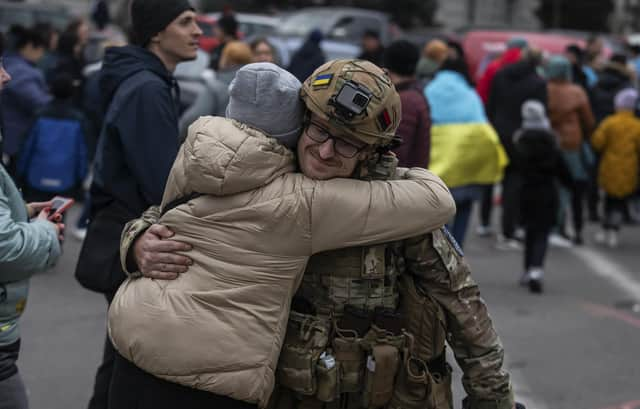War in Ukraine: Russia could send for further ‘cannon fodder’ after Kherson loss, says defence secretary Ben Wallace


The warning came as Ukrainian president Volodymyr Zelensky vowed to keep pushing Russian forces out of his country after they withdrew from Kherson, leaving behind devastation, hunger and booby traps.
Mr Wallace urged “caution” when considering the jubilant scenes on the streets of Kherson, as Ukrainians celebrated Moscow’s withdrawal from the only regional capital captured by Vladimir Putin’s army during the invasion to date.
Advertisement
Hide AdAdvertisement
Hide Ad“History will remind you that Russia can be brutal to their own,” he said. “If they need more cannon fodder, that is what they’ll be doing.”
It comes as British defence experts warned Moscow is planning to reprise a Soviet-era scheme whereby students were given “mandatory military training”, including experience handling Kalashnikov rifles.
“We see that today they announced children in schools are going to be trained, and that’s the type of regime we’re up against,” Mr Wallace said.
Speaking to broadcasters in Westminster, the defence secretary said Russia’s retreat from Kherson “shows remarkable capability by Ukraine”, noting: “It basically begs the question to the Russian population, effectively – what was it all for?”
He said it was up to the Ukrainians to decide “when and how” they negotiate with their neighbour, should they choose to do so.
Asked if now is the right time for talks, given Ukraine’s strong position, Mr Wallace said: “First of all, I don’t think we should be grateful when the thief gives back stolen goods – and that’s effectively what Russia has done.
Moscow’s withdrawal from the city just six weeks after illegally annexing the Kherson region marks a major setback for the Kremlin.
The exit was formally announced on November 9, but British defence intelligence analysts believe it is likely it started as early as October 22.
Advertisement
Hide AdAdvertisement
Hide AdChief of the Defence Staff, Admiral Sir Tony Radakin, said the Russian operation was failing “dramatically”.
He told the BBC’s Sunday with Laura Kuenssberg: “Russia wanted to weaken Nato and Nato’s even stronger. Then if you come down to the tactical fight, we’re seeing continued success by Ukraine.”
In his nightly video address on Saturday, Mr Zelensky vowed there would be “many more such greetings” of Ukrainian soldiers liberating Russian-held territory.
He pledged to the people in Ukrainian cities and villages that are still under occupation: “We don’t forget anyone, we won’t leave anyone.”
The US embassy in Kyiv tweeted comments by national security adviser Jake Sullivan, who described the turn-around in Kherson as “an extraordinary victory” for Ukraine and “quite a remarkable thing”.
The reversal came despite Mr Putin’s recent partial mobilisation of reservists, raising available troop numbers by some 300,000.
As Ukrainian forces on Sunday consolidated their hold on Kherson, authorities contemplated the daunting task of clearing out explosive devices and restoring basic public services in the city.
Comments
Want to join the conversation? Please or to comment on this article.